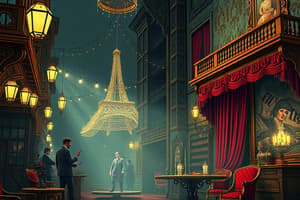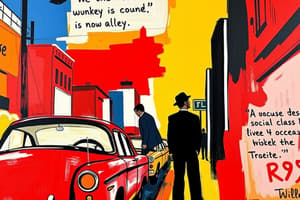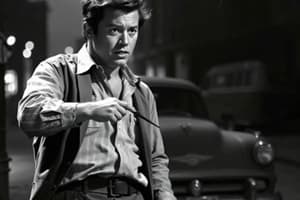Podcast
Questions and Answers
What does Williams' opening stage direction imply about the integration of races in New Orleans?
What does Williams' opening stage direction imply about the integration of races in New Orleans?
- It represents a conflict between races.
- It indicates that integration is common everywhere.
- It shows a lack of equality in social class.
- It demonstrates an equality in social class. (correct)
What does Stanley's clothing foreshadow about his character in relation to Blanche?
What does Stanley's clothing foreshadow about his character in relation to Blanche?
The distinct juxtaposition of Stanley's rough work clothes against Blanche's attire foreshadows their social class conflict.
How does Blanche's attire contrast with Stanley's?
How does Blanche's attire contrast with Stanley's?
Blanche is daintily dressed in a white suit, highlighting the tension in social class between her and Stanley.
What does it mean when it says Blanche's appearance is incongruous to the setting?
What does it mean when it says Blanche's appearance is incongruous to the setting?
What does Stella's use of animalistic imagery signify in the context of social class?
What does Stella's use of animalistic imagery signify in the context of social class?
What does Stanley's question about pearls and gold bracelets imply?
What does Stanley's question about pearls and gold bracelets imply?
What does Blanche's statement about being an English instructor reveal?
What does Blanche's statement about being an English instructor reveal?
Why does Blanche consider Stanley 'common'?
Why does Blanche consider Stanley 'common'?
What does Stanley's statement 'I am not a Polack' signify?
What does Stanley's statement 'I am not a Polack' signify?
What does Blanche's repetitive questioning about the grapes suggest?
What does Blanche's repetitive questioning about the grapes suggest?
Flashcards are hidden until you start studying
Study Notes
Social Class Representation
- Opening stage direction highlights racial integration in New Orleans, suggesting a complexity in social equality.
- Stanley's blue denim work clothes symbolize his working-class roots, contrasting sharply with Blanche's appearance, setting the stage for class conflict.
- Blanche’s white suit signifies her attempt to maintain an upper-class facade, further exacerbating social class tensions with Stanley.
Character Incongruity
- Blanche's presence is marked as incongruous within New Orleans society, emphasizing her disconnection from the environment and class norms.
- Her arrival contrasts with Antonio’s entrance in “Malfi,” showcasing the tension between different social classes.
Animalistic Imagery
- Stella’s comparison of Blanche and Stanley to different species underscores the divide in their social standings, reinforcing Blanche's struggles within a lower-class milieu.
Wealth and Manipulation
- Stanley's questioning of Stella regarding pearls and gold bracelets reveals his resentment towards wealth and uses class as a form of manipulation to create tension.
Intellectual Capacity
- Blanche’s admission of being an English instructor serves to elicit sympathy, highlighting her intelligence and subsequent victimization by Stanley, mirroring Bosola's experiences.
Superiority Complex
- Blanche's claim of Stanley's commonness illustrates her perception of social hierarchy, using an exclamative to underline her disdain.
Resistance to Discrimination
- Stanley's response to Blanche's derogatory comment showcases his resistance to social discrimination, revealing the underlying class conflict.
Stagnation and Repetition
- Blanche's insistence on cleanliness for the grapes exemplifies her obsession with social standards and a refusal to adapt, complicating reader sympathy as her downfall unfolds.
Studying That Suits You
Use AI to generate personalized quizzes and flashcards to suit your learning preferences.




